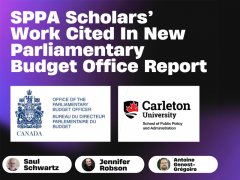SPPA Scholars’ Work Cited in New Parliamentary Budget Office Report

A new report by the Parliamentary Budget Office cites and is informed by SPPA Professor Emeritus Saul Schwartz, PhD Graduate and Director of the Political Management Program Jennifer Robson, and PhD Graduate and Assistant Professor at the University of Sherbrooke Antoine Genest-Grégoire.
Their work was also cited in a Globe and Mail Editorial on April 29: https://www.theglobeandmail.com/opinion/editorials/article-fill-in-the-blanks-on-automatic-tax-filing/.
Abstract
Low-income individuals who do not file Canadian personal income tax returns miss out on several important benefits delivered through the tax system and may have challenges in verifying eligibility for other income-tested public goods and services. The Canada Revenue Agency (CRA) could complete simple returns for many low-income families, subject to filer correction. Using the Longitudinal Administrative Databank, we estimate that this approach could be successful for more than half of families in the lowest four ventiles of the population and between 60 and 88 percent of families who rely on provincial income assistance programs. We also estimate that up to 4.6 million returns with income under $25,000 and that are classified by the CRA as “simple”, have likely involved a commercial tax preparer or software, emphasizing the potential advantage of the CRA providing completed returns in such cases.
The 2020 paper is referenced in this month’s PBO report as follows:
“A study by Robson and Schwartz (2020) found that between 10 and 12 per cent of Canadians do not file a tax return annually and may consequently miss out on benefits to which they would otherwise have been entitled.”
Abstract for the 2020 Paper
The Canada Revenue Agency administers dozens of cash transfer programs that require an annual personal income tax return to establish eligibility. Approximately 10–12 percent of Canadians, however, do not fi le a return; as a result, they will not receive the benefits for which they are otherwise eligible. In this article, we provide the first estimates of the number and characteristics of non-filers. We also estimate that the value of cash benefits lost to working-age non-filers was $1.7 billion in 2015. Previous literature suggests either a rational choice model of tax compliance (in which the costs of filing are weighed against its benefits) or a more complex behavioural model. Our study has important consequences for policy-making in terms of the administrative design and fiscal costs of public cash benefits attached to tax filing, the measurement of household incomes, and poverty rates.
That paper won the Vanderkamp Prize for the Best Paper in 2020 in Canadian Public Policy.